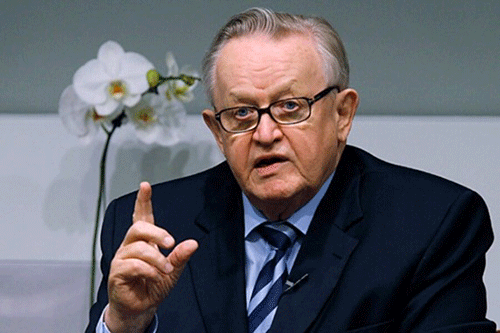Dr Peya Mushelenga
An adage in my language says, ‘A chicken passes through a narrow opening and leaves behind its feather – a person dies and leaves behind his name’.
This can appropriately be said for a person like Martti Oiva Kalevi Ahtisaari, former president of Finland because of his records of service to humanity and stewardship for peace. Born in Viipuri, Finland, in present-day Vyborg, Russia, on 23 June 1937, Ahtisaari grew up in the Finnish city of Kuopio and later in Oulu, where he obtained his primary school teaching qualification.
Save for the born-frees – the name Martti Ahtisaari evokes memories of the process leading to Namibia’s independence.
His preoccupation with the cause of Namibia’s freedom started in the mid-70s when he served as the UN Commissioner for Namibia from 1976 to 1981.
The position of the UN Commissioner for Namibia was established in 1966 as the de jure head of the government when the UN asserted its responsibility over Namibia, which stems from the designation of the country as a C-Mandate Territory of League of Nations, the precursor to the UN, in 1920. It was during his tenure as the UN Commissioner for Namibia that Ahtisaari visited Namibia and went to northern Namibia to meet with the leadership of the Evangelical Lutheran Owambo-Kavango Church – now Evangelical Lutheran Church in Namibia under Bishop Leonard Auala, where they agreed on the church’s role in the reception of repatriated Namibians.
At the implementation of the UN Security Council Resolution 435/78, which outlined the process of transition to Namibia’s independence in 1989, Ahtisaari was deployed as Special Representative of the UN secretary general, presiding over the United Nations Transitional Assistance Group. The exchange of gunfire between Swapo’s People’s Liberation Army of Namibia and South African forces on 1 April 1989 took the wind out of the sail and nearly spoiled the show. Mark my words, we almost kissed independence goodbye.
When even our comrades, allies and friends the world over were fuming that, ‘let the horse fall with its rider’, Ahtisaari stayed put. He stormed through thunderstorms and whirlwinds to midwife the birth of the baby. Truth be told for correct history’s sake – he made the impossible possible!
The inevitable happened, i.e. the situation normalised, elections were held and Namibia became independent!
Ahtisaari was a renowned international civil servant and diplomat par excellence. This earned him admiration, trust and respect among his fellow countrymen and women.
Not surprisingly, they elevated him to the highest office of the land. The diplomat from Oulu was elected president of Finland and served his country with distinction.
The distinguished Suomalainen was a sought-after peacemaker. During his presidential tenure, he was involved in negotiations to end the conflict in the Yugoslav province of Kosovo.
Following years of continued conflicts in that region, after he had left office, the UN turned to him for conflict resolution and deployed him as Special Envoy of the UN secretary general in November 2005.
In the following year, 2006, Ahtisaari opened the UN mission office in Vienna, from where he carried out shuttle diplomacy for Kosovo’s status negotiations.
The highly-rated statesman was a giant of a man in physical stature and political acumen. He had the brain of a heavyweight peace broker, skilful negotiator and accomplished mediator. He extracted honey from a sour solution, water from a dry rock and grew sugarcane in a saltpan.
Oh, yes! Ahtisaari turned misery into laughter and anxiety into assurance. I have high regard for his diplomatic savvy and political astuteness. His diplomatic career included Ambassador of Finland to the United Republic of Tanzania, from 1973 to 1976, supervision of Namibia’s transition to independence from 1989 to 1990, mediation in the Bosnia-Herzegovina talks, from 1992 to 1993, conflict resolution in Northern Ireland, from 2000 to 2001, mediation between the Indonesian government and separatist Free Aceh Movement, 2005, mediation between Iraqi Sunni and Shiʿi Muslims, from 2007 to 2008.
It is no surprise that many governments and international organisations bestowed upon him accolades for his achievement in various spheres. To express gratitude for the crucial role that Ahtisaari played in the attainment of Namibia’s independence, President Sam Nujoma granted Ahtisaari honorary citizenship for Namibia in 1992 in terms of section 6 of the Namibia Citizenship Act, No. 14 of 1990.
Ahtisaari was further awarded the J. William Fulbright Prize for International Understanding in 2000; Honorary Officer in the Order of Australia, in 2002; the Order of The Companion of Oliver Tambo by the South African Government for his outstanding achievement as a diplomat and commitment to the cause of freedom in Africa and peace in the world in 2004; the prestigious Nobel Peace Prize for his work to resolve international conflicts in 2008, and the UNESCO Félix Houphouët-Boigny Peace Prize in 2008 – and the list goes on endlessly. He was further conferred honorary doctorates by the University of Namibia and the University College, London.
What is in a name?
An irony about Ahtisaari is that a man with a Spanish and Catalan name. Martti, meaning ‘warlike’, became one of the acclaimed peace-brokers to end the war in the world.
Oiva is a Finnish name, meaning ‘splendid’. Indeed, this first-class mediator excelled and impressed the world with his talent to put down the fire in conflicts.
Kalevi is a Finnish name, meaning ‘hero’. Ahtisaari is a hero to many as illustrated by several recognitions and awards bestowed upon him that I have just narrated above.
The sun set on 16 October. I express sincere condolences to the widow, Ms Eeva Ahtisaari, and son Marko.
Mene hyvin, kunnes tapaamme taas! Ottakoot enkelit sinut vastaan!
*Dr Peya Mushelenga is the minister of Information and Communication Technology.



